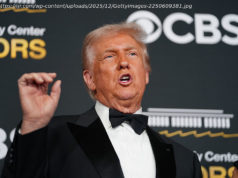 It was at Lancaster House in 1988 that Margaret Thatcher delivered a speech heralding British membership of the single market. Twenty eight years later, at the same venue, Theresa May confirmed the UK’s retreat.
It was at Lancaster House in 1988 that Margaret Thatcher delivered a speech heralding British membership of the single market. Twenty eight years later, at the same venue, Theresa May confirmed the UK’s retreat.
As had been clear ever since her Brexit speech in October, May recognises that her primary objective of controlling immigration is incompatible with continued membership. Inside the single market, she noted, the UK would still have to accept free movement and the rulings of the European Court of Justice (ECJ). “It would to all intents and purposes mean not leaving the EU at all,” May surmised.
The Prime Minister also confirmed, as anticipated, that the UK would no longer remain a full member of the Customs Union. “We want to get out into the wider world, to trade and do business all around the globe,” May declared.
But she also recognises that a substantial proportion of this will continue to be with Europe (the destination for half of current UK exports). Her ambition, she declared, was “a new, comprehensive, bold and ambitious Free Trade Agreement”. May added that she wanted either “a completely new customs agreement” or associate membership of the Customs Union.
Though the Prime Minister has long ruled out free movement and the acceptance of ECJ jurisdiction, she has not pledged to end budget contributions. But in her speech she diminished this potential concession, warning that the days when the UK provided “vast” amounts were over.
Having signalled what she wanted to take from the EU, what did May have to give? She struck a notably more conciliatory tone, emphasising that it was “overwhelmingly and compellingly in Britain’s national interest that the EU should succeed”. The day after Donald Trump gleefully predicted the institution’s demise, her words were in marked contrast to those of the president-elect.
In an age of Isis and Russian revanchism, May also emphasised the UK’s “unique intelligence capabilities” which would help to keep “people in Europe safe from terrorism”. She added: “At a time when there is growing concern about European security, Britain’s servicemen and women, based in European countries including Estonia, Poland and Romania, will continue to do their duty. We are leaving the European Union, but we are not leaving Europe.”
The EU’s defining political objective is to ensure that others do not follow the UK out of the club. The rise of nationalists such as Marine Le Pen, Alternative für Deutschland and the Dutch Partij voor de Vrijheid (Party for Freedom) has made Europe less, rather than more, amenable to British demands. In this hazardous climate, the UK cannot be seen to enjoy a cost-free Brexit.
May’s wager is that the price will not be excessive. She warned that a “punitive deal that punishes Britain” would be “an act of calamitous self-harm”. But as Greece can testify, economic self-interest does not always trump politics.
Unlike David Cameron, however, who merely stated that he “ruled nothing out” during his EU renegotiation, May signalled that she was prepared to walk away. “No deal for Britain is better than a bad deal for Britain,” she declared. Such an outcome would prove economically calamitous for the UK, forcing it to accept punitively high tariffs. But in this face-off, May’s gamble is that Brussels will blink first.
Theresa May will outline her approach to Britain’s Brexit deal in a much-hyped speech later today , with a 12-point plan for Brexit.
The headlines: her vow that Britain will not be “half in, half out” and border control will come before our membership of the single market.
And the PM will unveil a new flavour of Brexit: not hard, not soft, but “clean” aka hard but with better PR.
“Britain’s clean break from EU” is the i ’s splash, “My 12-point plan for Brexit” is the Telegraph ’s, “We Will Get Clean Break From EU” cheers the Express , “Theresa’s New Free Britain” roars the Mail , “May: We’ll Go It Alone With CLEAN Brexit” is the Metro ’s take. The Guardian goes for the somewhat more subdued “ May rules out UK staying in single market” as their splash while the Sun opts for “Great Brexpectations”.
You might, at this point, be grappling with a sense of déjà vu. May’s new approach to the Brexit talks is pretty much what you’d expect from what she’s said since getting the keys to Downing Street, as I wrote back in October. Neither of her stated red lines, on border control or freeing British law from the European Court of Justice, can be met without taking Britain out of the single market aka a hard Brexit in old money.
What is new is the language on the customs union, the only area where May has actually been sparing on detail. The speech will make it clear that after Brexit, Britain will want to strike its own trade deals, which means that either an unlikely exemption will be carved out, or, more likely, that the United Kingdom will be out of the European Union, the single market and the customs union.
(As an aside, another good steer about the customs union can be found in today’s row between Boris Johnson and the other foreign ministers of the EU27. He is under fire for vetoing an EU statement in support of a two-state solution, reputedly to curry favour with Donald Trump. It would be strange if Downing Street was shredding decades of British policy on the Middle East to appease the President-Elect if we weren’t going to leave the customs union in order at the end of it.)
But what really matters isn’t what May says today but what happens around Europe over the next few months. Donald Trump’s attacks on the EU and Nato yesterday will increase the incentive on the part of the EU27 to put securing the political project front-and-centre in the Brexit talks, making a good deal for Britain significantly less likely.
Start
United States
USA — Political Theresa May gambles that the EU will blink first Theresa May's "clean...






